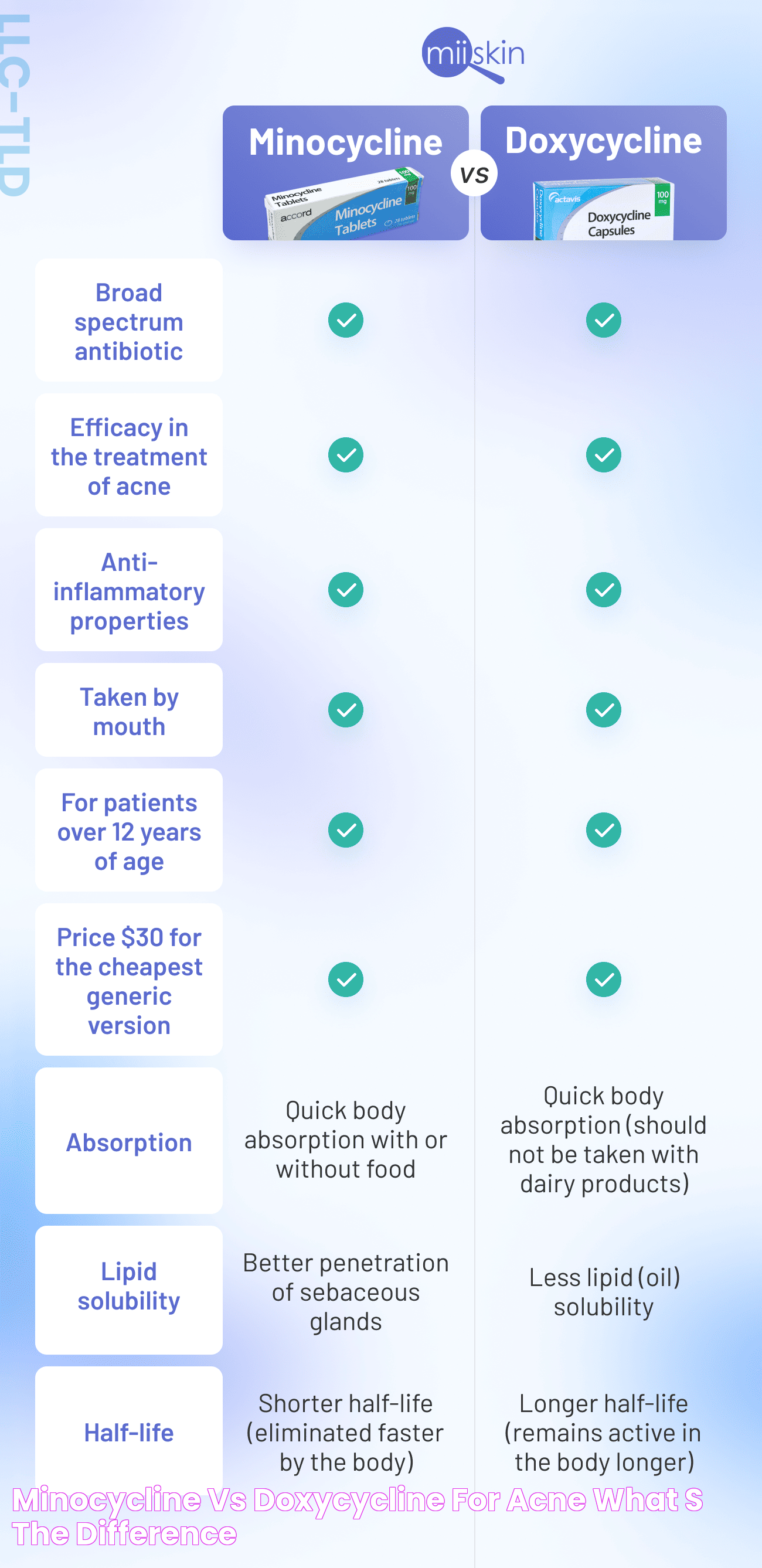Doxycycline monohydrate is primarily used to treat infections caused by bacteria, including respiratory tract infections, skin infections, and certain sexually transmitted diseases. Despite its widespread use, some individuals may experience side effects that range from mild and temporary to severe and persistent. Recognizing these side effects early can help mitigate their impact and improve patient outcomes. In this article, we will delve into the various side effects of doxycycline monohydrate, providing a comprehensive overview to aid patients and healthcare professionals in making informed decisions. By understanding the potential risks and how to address them, patients can continue their treatment with confidence and assurance. **Table of Contents** 1. What is Doxycycline Monohydrate? 2. How Does Doxycycline Monohydrate Work? 3. Common Uses of Doxycycline Monohydrate 4. What are the Common Side Effects of Doxycycline Monohydrate? - How do these side effects manifest? - Are these side effects temporary or permanent? 5. Less Common but Serious Side Effects - What should you do if you experience serious side effects? 6. Allergic Reactions and Hypersensitivity 7. Gastrointestinal Side Effects: What to Expect? 8. Doxycycline Monohydrate and Skin Reactions 9. Impact on Liver and Kidney Function 10. Doxycycline Monohydrate and Photosensitivity: A Warning? 11. Who Should Avoid Doxycycline Monohydrate? 12. How Can You Manage Side Effects Effectively? 13. FAQs about Doxycycline Monohydrate Side Effects 14. Conclusion
What is Doxycycline Monohydrate?
Doxycycline monohydrate is an antibiotic belonging to the tetracycline class of medications. It is designed to combat a range of bacterial infections by inhibiting the production of proteins essential for bacterial growth. This interruption in protein synthesis prevents bacteria from multiplying and spreading, allowing the body's immune system to eliminate the infection more effectively.
As a widely utilized antibiotic, doxycycline monohydrate is available in various forms, including tablets and capsules, making it convenient for patients to incorporate into their treatment regimen. Its versatility and efficacy have made it a staple in medical practice, especially for patients who are allergic to penicillin-based antibiotics.
Read also:Kimothy K Met Gala A Night Of Glamour And Elegance
How Does Doxycycline Monohydrate Work?
The mechanism behind doxycycline monohydrate involves its ability to bind to the 30S ribosomal subunit of bacteria, effectively blocking the attachment of transfer RNA (tRNA) to the messenger RNA (mRNA)-ribosome complex. This disruption impedes the translation process necessary for protein synthesis, leading to the bacteriostatic effect that halts bacterial growth.
While doxycycline monohydrate does not kill the bacteria outright, it significantly hinders their ability to proliferate, providing the immune system with an opportunity to address the infection. This mode of action is particularly beneficial for treating both acute and chronic bacterial infections.
Common Uses of Doxycycline Monohydrate
Doxycycline monohydrate is prescribed for a variety of infections, including:
- Respiratory tract infections such as pneumonia and bronchitis
- Skin and soft tissue infections, including acne
- Sexually transmitted infections like chlamydia
- Urinary tract infections
- Some tick-borne diseases like Lyme disease
Its broad-spectrum activity against numerous bacteria makes it a preferred choice for treating infections where the causative organism is not immediately identified. Additionally, its use in long-term treatment scenarios, such as acne, underscores its value in dermatological applications.
What are the Common Side Effects of Doxycycline Monohydrate?
The side effects of doxycycline monohydrate can vary among individuals, with some experiencing mild discomfort while others may encounter more significant reactions. Common side effects include:
- Nausea and vomiting
- Diarrhea or loose stools
- Loss of appetite
- Sensitivity to sunlight (photosensitivity)
- Headache
How do these side effects manifest?
These side effects typically manifest shortly after starting the medication and may persist for the duration of the treatment. They often result from the body's adjustment to the antibiotic and tend to resolve once the treatment course is completed.
Read also:Benefits And Uses Of Natural Body Oil For Skin Health
Are these side effects temporary or permanent?
Most common side effects are temporary and subside after discontinuation of the medication. However, if they persist or become bothersome, it is essential to consult a healthcare provider for further evaluation and management.
Less Common but Serious Side Effects
While rare, some individuals may experience serious side effects that require immediate medical attention. These include:
- Severe skin reactions such as Stevens-Johnson syndrome
- Difficulty swallowing or pain when swallowing
- Persistent or severe headaches accompanied by vision changes
- Severe diarrhea or bloody stools
What should you do if you experience serious side effects?
If any of the above serious side effects occur, it is crucial to seek medical attention promptly. Early intervention can prevent complications and ensure appropriate treatment adjustments are made.
Allergic Reactions and Hypersensitivity
Allergic reactions to doxycycline monohydrate can manifest as hives, rash, itching, or swelling, particularly of the face, tongue, or throat. In rare cases, a severe allergic reaction known as anaphylaxis may occur, characterized by difficulty breathing and dizziness. Such reactions necessitate immediate emergency medical care.
Gastrointestinal Side Effects: What to Expect?
The gastrointestinal tract is often affected by doxycycline monohydrate, with nausea, vomiting, and diarrhea being the most common complaints. To minimize these effects:
- Take the medication with food or a full glass of water
- Avoid lying down immediately after taking the medication
- Consult a healthcare provider if symptoms persist or worsen
Doxycycline Monohydrate and Skin Reactions
Skin reactions, particularly increased sensitivity to sunlight, are a notable side effect of doxycycline monohydrate. Patients are advised to:
- Use sunscreen with a high SPF
- Wear protective clothing when outdoors
- Avoid tanning beds and excessive sun exposure
These precautions can help mitigate the risk of sunburn and related skin damage.
Impact on Liver and Kidney Function
Doxycycline monohydrate is metabolized by the liver and excreted by the kidneys, making liver and kidney function important considerations in its use. Patients with pre-existing liver or kidney conditions should undergo regular monitoring to prevent potential complications.
Doxycycline Monohydrate and Photosensitivity: A Warning?
Photosensitivity is a well-documented side effect of doxycycline monohydrate, which can lead to severe sunburn even with short sun exposure. Preventative measures, such as applying sunscreen and wearing protective clothing, are essential for patients taking this medication.
Who Should Avoid Doxycycline Monohydrate?
Certain populations should exercise caution or avoid doxycycline monohydrate altogether, including:
- Pregnant or breastfeeding women
- Children under the age of 8
- Individuals with known allergies to tetracycline antibiotics
Consulting a healthcare provider before starting doxycycline monohydrate is crucial for these individuals to assess potential risks versus benefits.
How Can You Manage Side Effects Effectively?
Managing side effects involves a combination of preventative measures and responsive actions, such as:
- Staying hydrated and maintaining a balanced diet
- Taking the medication as prescribed and at recommended times
- Reporting any persistent or severe side effects to a healthcare provider
FAQs about Doxycycline Monohydrate Side Effects
- Can doxycycline monohydrate cause long-term side effects?
Most side effects are temporary, but long-term use should be monitored by a healthcare provider to prevent potential complications.
- Is it safe to consume alcohol while taking doxycycline monohydrate?
Alcohol may exacerbate certain side effects, so it is advisable to limit or avoid alcohol consumption during treatment.
- Can doxycycline monohydrate affect my mental health?
While rare, some individuals may experience mood changes or anxiety. Report such symptoms to a healthcare provider.
- What should I do if I miss a dose?
Take the missed dose as soon as you remember, unless it is close to the time for your next dose. Do not double up doses.
- Are there any dietary restrictions while taking doxycycline monohydrate?
Avoid taking the medication with dairy products or calcium supplements, as they can interfere with absorption.
- How long do side effects last?
Most side effects resolve after completing the treatment, but consult a healthcare provider if they persist.
Conclusion
Understanding doxycycline monohydrate side effects is essential for both patients and healthcare providers to ensure safe and effective treatment. By recognizing, managing, and addressing these side effects, individuals can maintain their health and well-being while benefiting from the antibiotic's therapeutic effects. Ongoing communication with healthcare professionals and adherence to prescribed treatment plans are key to minimizing risks and maximizing positive outcomes.

